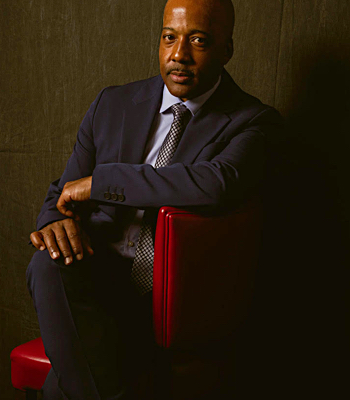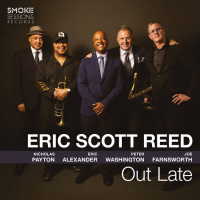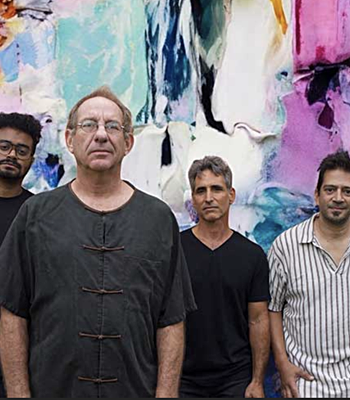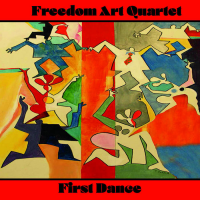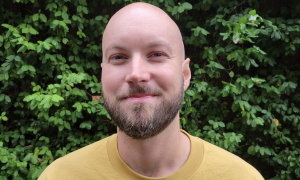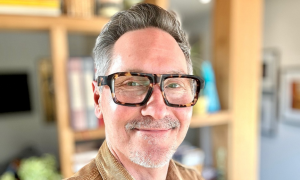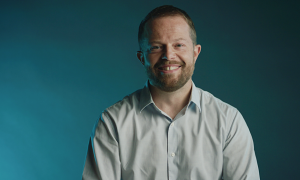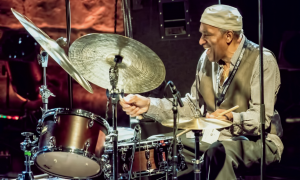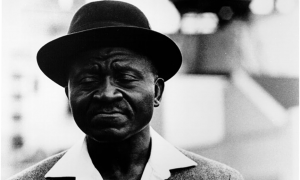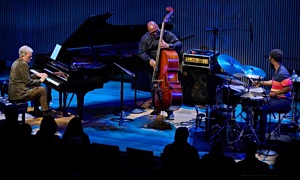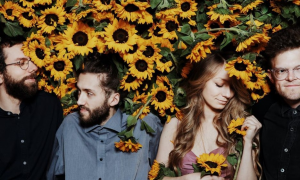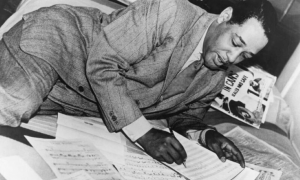Home » Jazz Articles » Chats with Cats » The Ukraine Connection: Sandy Eldred
The Ukraine Connection: Sandy Eldred

A lot of my friends had to put down their instruments for months and they were just trying to help collect supplies, bring supplies to people on the front line, raise money, and stay safe
—Sandy Eldred
With this in mind, it was enlightening to speak to someone who has a connection to the Ukrainian jazz scene and who can give some insight into the strength of that scene before the war and how it's carrying on now. Sandy Eldred, a bassist out of Philadelphia, became intimately connected with the jazz world of Ukraine from his frequent touring there. He shed some light on all of this as well as the many projects of his own.
About Sandy Eldred
Sandy Eldred is an internationally acclaimed bassist, recording artist, producer, composer, and educator known for his command across music genres. He leads U.S.E. Trio, a wildly energetic band from Philadelphia,, and is the longtime bassist for Norman David & The Eleventet, one of the country's most distinctive large jazz ensembles.Eldred is the founder of the record label Each and Only and PhillyJazzScene, a key online resource for live jazz and improvised music in Philadelphia. He curates the Creative Concepts in Jazz Series and Jazz Night at the Ukrainian League and is an original member of Jazz Mission, an international educational project in Ukraine.
All About Jazz: I couldn't find a lot of bio info on you but I take it that you have a Ukrainian background. Is that right?
Sandy Eldred: Yeah, I'm not from Ukraine but I have family heritage on my father's side. My dad's Ukrainian so I have the blood in there.
AAJ: Do you still have a lot of family in Ukraine?
SE: No, I'm pretty much from the usual American family. I think it was my grandmother's parents who came over from Ukraine, so I'm a few generations removed. But, basically, my connection started with one of my best friends now, the tenor saxophonist Bogdan Gumenyuk, who was a Fulbright student who I met at the University of the Arts in Philly. He and I connected and he's from Ukraine. He was living there before he moved to the States to come to school. We connected by me having Ukrainian heritage, and him being from Ukraine. We also just enjoyed playing music together so that friendship led to my connection to the scene there over the years.
AAJ: Tell me about the jazz scene in Ukraine. I'm sure most of us here don't know much about it.
SE: Yeah, I had no idea what it was going to be like the first time I went there. I went for the first time, I think, in 2016. There was a jazz festival that a friend of Bogdan's had started that at the time was going by All Music is Jazz, I think. After its first or second year they changed the name of this festival to Am I Jazz. And, now, they've actually morphed into a third mentorship program that's called Time Based.
So that whole organization has gone through a lot of change over the years, but All Music is Jazz was my introduction to the scene and I was absolutely blown away. Part of this festival was that they invited musicians over from the States and other countries to come over and perform. A few of us were actually resident teachers, so they hooked us up with the younger generation of college students and young professionals that were getting their career started over there. We had master classes and each one of us had our own ensemble that we would direct. Then, there was an ensemble concert at the end of the festival and I was just blown away. I met dozens of young students who not only could play really well, but they knew the repertoire, and they were clearly very into the music, studying it both in school and on their own time. I was just really taken back by the level of the students.
Kyiv is a really big city. It's comparable to New York. You get on the subway and it's just packed with people. There's just people everywhere. So the clubs there have that kind of vibe too. Clubs are open late, musicians are playing, and they're playing at a really high level. It was pretty cool for me to see that.
AAJ: And there seems to be a receptive audience for jazz?
SE: I think so. I don't want to make a blanket statement or anything but I feel like, in these post-Soviet countries, people were so hungry for this music and they're so interested in it because it's not from where they are. So, every time I would go over to Ukraine, I always felt a really warm and welcoming reception just for being an American musician. And the fans were always so happy to come up to talk, and ask questions. I don't even know if it was because we played well or not, but we would get standing ovations and I was not really used to getting those over here in the U.S. So, there's a really appreciative and interested audience for sure.
AAJ: That's really cool. Tell me a little bit more about the educational things that you did while you were there.
SE: Sure. So, there's a school in Kyiv, I think it's called R Glier Music Academy, and it's a college. Students over there start kind of young. I think you can start college when you're 16 and they go well into their early 20s. It's a much longer program than what we're used to here with the four year stuff.
So, my friend Bogdan is associated with that as well as the trumpet player Dennis Adu. He's pretty big on the scene over in Ukraine. All About Jazz recently started posting articles in a series that they're doing about Ukraine and they talk about Dennis in an article. He teaches students there and is also a Director. He teaches the big band and is also a really good friend of mine.
So, the biggest thing that we did was a project called Jazz Mission. It was a collaborative effort between Bogdan, Dennis, a pianist named Yuriy Seredin, drummer Pavlo Halytskyi, and myself. It was a band of mostly Ukrainian musicians and myself coming over from the States. We booked a month-long tour where we would travel to different universities across the country, and the whole idea of the project was to expose the students to this level of playing, give them a chance to meet us, learn from us, and get the experience of being around musicians who've seen places and done things.
So we would go to the university in the morning, give a master class for a couple of hours, break for lunch, then give private lessons or do instrument specific workshops. Like I would have a bass class and Dennis would have a trumpet class. Then, in the evenings, we would play concerts for the community. The students would, of course, be there but we also opened it up to the public where they could come too. And this was just one of the coolest things I think I've ever done. We would just go to some distant towns where there's really not a whole lot of jazz happening and certainly not a whole lot of professionals from other countries coming through to play.
It was a really special experience that was about a month long I think. We ended up going to ten or eleven major cities across the country and probably encountered a few hundred students over the course of that time. I still connect with some of these people today. I'm still messaging with some of the students that I worked with in places like Kharkiv, Dnipro, Lviv, and other cities in Ukraine. It was a really special experience.
AAJ: You started going before the war and I take it you've been back since the war started. You must've seen a big difference. Can you talk about what you've seen?
SE: Well, actually, the last time I was there was like three months before the war started. I haven't been back since. Hopefully things will turn around for the better at some point, but things are definitely different. We were there just before the war and there was that buzz in the air like something was going to happen. Bogdan runs a record label called Label Who Able, which is a Ukrainian jazz label that also collaborates with a bunch of musicians from the States and Europe.
We were over there doing a recording project and you could definitely feel that energy. Everything was fine at the time. It was still safe and then, as soon as I came back, it was only a few more months until the war broke out. It was devastating and it is devastating. A lot of my friends had to put down their instruments for months and they were just trying to help collect supplies, bring supplies to people on the front line, raise money, and stay safe. People were hiding down in the subways and others had to leave their homes because the areas that they lived in weren't safe. A lot of my friends went west to Lviv. It seemed like the best place to be, just far enough away from the front lines.
I can't attest too much to what it's like now. I haven't seen it with my own eyes since the war started. But, a lot of my friends, and a lot of those students who I met over the years are still there and they're persisting, which is great. People are still gigging. It took a little while but clubs reopened and they just have to deal with this mess. It's very unpredictable. You never know when something's going to happen. You could be playing and all of a sudden an air raid siren goes off and you have to stop everything you're doing.
AAJ: I guess they're trying to get back to some normalcy.
SE: Of course. You have to work. There's still a system in place. The economy needs to keep moving and people just can't stay isolated forever. I'm actually extremely proud of everyone over there. I think it's really cool that they're still doing the thing.
I sit at home sometimes, go online, and I'll see my friends live streaming from a little club and It brings back a lot of memories. I really do miss the place and if it weren't for the war, I'm sure I would be back-and-forth a lot like I used to be. Bogdan is actually living in Montreal now with his family and he hasn't been back since the war started either. We're both just itching for some kind of a moment where we feel like it's going to be OK to return.
AAJ: Considering there's been a recent change in American policy, what are you hearing from people over there? Are they hopeful? Are they discouraged?
SE: I think most for the most part people are a little taken aback and discouraged right now. The instant reaction that I saw from some of my friends in Ukraine was just a jaw dropping, like, "wow. I can't believe that." But, we'll just have to see how it all plays out.
I think there is a bit of hope. I think if the U.S. is going to be doing what they're saying they're going to be doing then it's time for other countries to stand up and help. In a weird way this could be something good as long as we have the support from other other people.
AAJ: I know that you have a lot going on here at home including your own label. Can you tell me about that?
SE: Sure. I have a band called U.S.E. Trio. It's myself on the bass, a fantastic drummer named Matt Scarano, and this cat Andrew Urbina on alto. Andrew is one of my favorite musicians on the planet, he's just so unique. I'd be hard pressed to find other players out there that play the way that he does. He's just an incredible musician.
So, we've put out five or six records at this point. I have other projects with friends and also have friends in Philly who are doing some really cool things within the realm of jazz, and also the overarching improvised music umbrella. After a while, I just started thinking. I have this engineer that I work with, his name is John Anthony. He's been on the scene for decades doing everything from jazz to rock. He and I have produced like a dozen records at this point and I just kept thinking, "Why don't we just start our own thing?" We make all these projects and sometimes they're independently released, sometimes we would talk to friends who have labels in different places, and after a while I just figured if we're literally producing all this stuff ourselves, we should create some kind of label for it.
So, it's been about a year and a half, maybe two years, since I decided to officially launch the label. It's been going pretty well. It's kind of a slow thing. I'm just starting to spread the word that it's out there. I needed to get my ducks in a row, plan out some recording projects, and start releasing things under the label. But, at this point, I think we have probably close to ten or so albums. There are a few sessions that are booked for the spring, and a couple in the summer, so there's going to be a few more records coming out on the label this year.
AAJ: I noticed that you seem to be involved in organizing the scene within Philly itself, in particular with a website. Do you want to tell me about that?
SE: Sure, I would be happy to. It's kind of been my main thing lately. As a musician you have to do a lot of self-promotion and over the years I've been building websites for projects that I've been involved with. I've made websites for myself, for bands that I'm in, and for the label. So, I started to make like a little side hustle of doing websites for people. I've always had this idea in the back of my mind. I've been a curator for close to ten years now. There's a venue, it's actually a Ukrainian club here in Philly, and it's called the Ukrainian League. I host a monthly jazz night there. There's also a venue in Fishtown that I used to host a monthly jazz night at called the MAAS building.
So for almost ten years I've been doing that and I've had people come up to me dozens of times and say, "Sandy, this is so great. I'm so glad I met you at that coffee shop and you told me you were a bassist because, if I hadn't, I never would've known about this place." Or, "I never would've known about this series." I just started hearing that again and again, and I started thinking about all of my friends who have great series and realizing that we're all doing these amazing things but it's so hard for people to find out about them. There's not really a central place in our town for DIY concert series for small venues.
So, I've been doing this web design stuff and I just decided to start building this website on the side. It's called PhillyJazzScene and, basically, what I'm doing is collaborating with musicians and venues in the area from jazz clubs to living room house concerts. I'm collaborating with all of these people and different organizations. I'm actually talking with a few people who are going to be hosting festivals this year and I'm just trying to create a central place where people can find out about everything that's going on around town.
The homepage is a calendar of events. It could be everything from something in Center City to out in the suburbs. And, it's a real time calendar. One of my frustrations with Facebook and Instagram has been that you make a post and, sometimes, people don't see it for like a week. The algorithm really distorts time and I wanted to create a calendar that is real time. So, if you go on the website, the first thing that you see is the very next concert and as soon as that one's over, the one following that is next in line. That way, if somebody's visiting Philly and they find out about the website, if they want to hear music right now or this evening, they can find something that maybe they wouldn't have known about otherwise.
So, that's been about three months now and we're just getting started.
AAJ: How do you feel about the scene in Philly. Do you think that it's strong?
SE: I love it man. I've always been happy to be here. Philly has a deep history with this music and there's still a lot of great older players who've been around, stuck around, and mentor people like myself and people that are younger than me. I came up going to sessions, hanging out, and seeing the cats at Ortlieb's and cats playing at Chris' Jazz Cafe. I still hang around some of these older musicians. But, we're also so close to New York too so we have that camaraderie with people up there. So, it's a great place to live in terms of its proximity to New York and Washington D.C.
AAJ: I agree. I think there's definitely a lot of crossover of musicians from the New York and Philly areas.
SE: Yeah, and the level of playing is just really high here. You know, Philly is a swing town. We like to play tunes and we like to go in and improvise. I've been lucky. I moved here and started playing bass because my uncle was a bassist. He's like, "Man, if you play bass you're always going to get work." I was like, "OK" [laughs].
But, he's right. I started going to school and I started getting gigs and I really haven't looked back. I've always had enough to keep me going. I feel like Philly is a little bit slower than New York. It's a little bit easier to navigate getting around. It's been great for me to develop these bands, these projects, and these series that I'm curating. I just feel like it's that whole blossom where you're planted, or whatever. I'm probably butchering that statement [laughs] but people are always like, "Oh, I could've lived there or I could've lived there." But you have to do your best with where you're at. So I feel like Philly, for me personally, has really been a great city.
AAJ: Awesome. Well, that's all I had prepared to ask you. Is there anything that I missed or something that you want to talk about?
SE: No, I don't think so. I just really appreciate what you're doing. The people in Ukraine are so special to me and I miss them dearly. It's really great to see that All About Jazz is interested in this.
Tags
Chats with Cats
B.D. Lenz
United States
Pennsylvania
Philadelphia
Bogdan Gumenyuk
Kyiv
New York
Dennis Adu
Yuri Seredin
Pavlo Halytskyi
Ortlieb's
Chris' Jazz Cafe
Washington D.C.
Comments
PREVIOUS / NEXT
Support All About Jazz
 All About Jazz has been a pillar of jazz since 1995, championing it as an art form and, more importantly, supporting the musicians who make it. Our enduring commitment has made "AAJ" one of the most culturally important websites of its kind, read by hundreds of thousands of fans, musicians and industry figures every month.
All About Jazz has been a pillar of jazz since 1995, championing it as an art form and, more importantly, supporting the musicians who make it. Our enduring commitment has made "AAJ" one of the most culturally important websites of its kind, read by hundreds of thousands of fans, musicians and industry figures every month.





